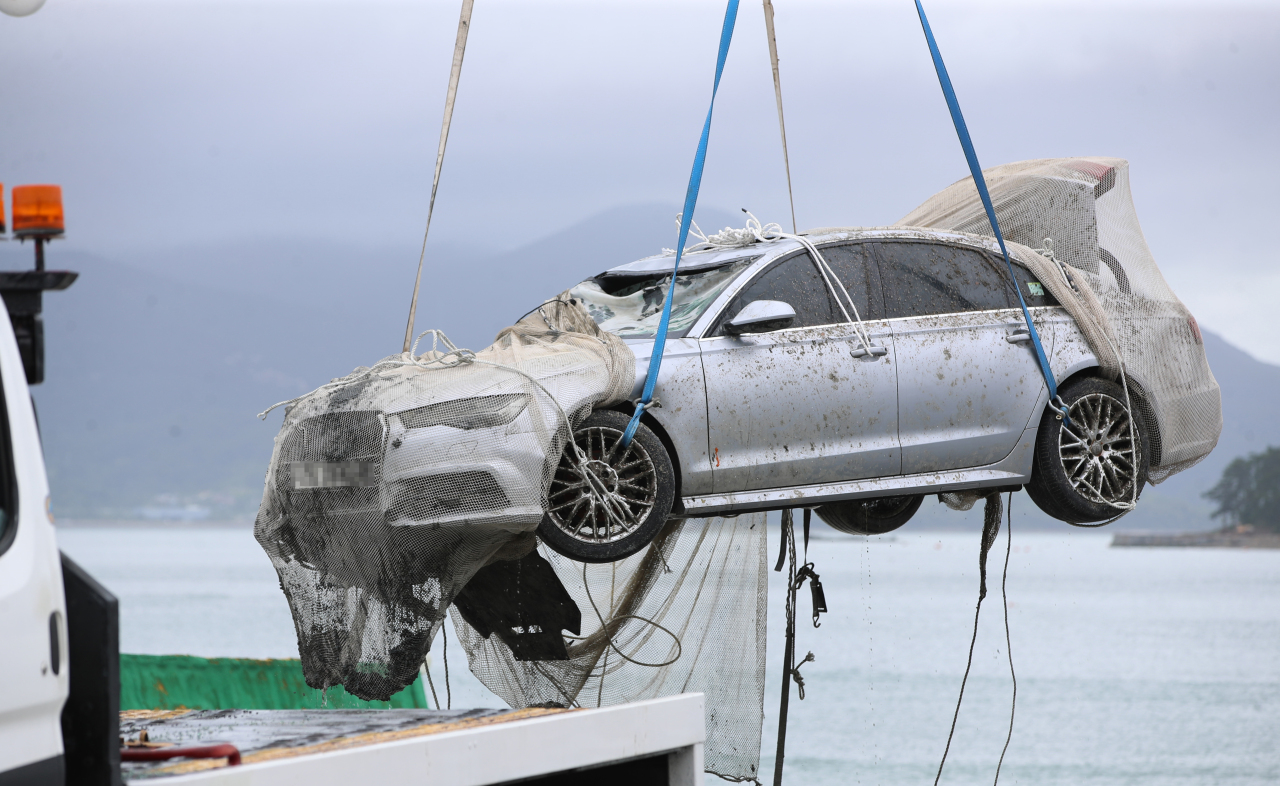 |
The police pulls a submerged car which belonged to Cho`s family off the shores of Wando, South Jeolla Province, Wednesday. (Yonhap) |
A family gone missing on an island off the southern coast has sparked discussion on the blind spot of students missing class for extracurricular activities with the consent of their parents.
On Wednesday, police pulled up a submerged car with three bodies inside it in Wando, South Jeolla Province. Though police had not yet confirmed as of press time whether it was the family in question found in the car, the bodies of two adults, a man and a woman, as well as a child were found inside the vehicle. The bodies will be sent for an autopsy.
The vehicle belonged to a family of three who had been reported missing, including 10-year-old Cho Yu-na and her parents. It had been a month since the family was last seen on the island.
Police are investigating the case based on the possibility of suicide, as Cho’s parents searched for words related to sleeping pills and cryptocurrency before going missing. They also had debt of about 100 million won ($77,000).
Police have been searching for the family since Cho’s school in Gwangju reported on June 22 that the student did not return to school after leaving for a family trip as part of an “extracurricular class.”
Elementary and middle schools here can permit students to miss classes by signing up for extracurricular activities under the supervision of parents or legal guardians.
The Enforcement Decree of the Elementary and Secondary Education Act states that the head of a school may grant permission for extracurricular classes with the consent of guardians.
Cho’s parents requested leave stretching across 18 school days for their child, from May 19 to June 15, saying they would be staying on Jeju Island. When Cho did not show up to classes after that period, and was unable to be reached after a few days, her school reported the case to police.
Though the law stipulates that education offices should report to police if students miss school for three days or more and cannot be reached, schools do not have the right to check on the whereabouts of a student on an out-of-school field trip.
Schools and education offices also have differing rules on extracurricular class leave, making it difficult to guarantee the safety of children.
For instance, Cho’s family frequently signed up for extracurricular activities this year. She left school for 35 days in total across seven occasions from March. Though some schools do not allow students to leave school for such extended periods, Cho’s school does not have specific rules limiting students’ absences.
Meanwhile, schools in Incheon are required to check on students who are missing from school for a long period of time. Teachers are required to call students who are studying from home or on extracurricular leave at least once a week. If the child is unable to be reached, teachers can report the case to the authorities.
The extracurricular leave system has more loopholes. Schools are not required to confirm the details on the extracurricular class leave as parents do not have to submit details. They can simply apply for the leave through the school’s website.
With Cho Yu-na and her family going missing, some are calling out for schools to provide standardized policies for extracurricular leave to ensure the safety of children as some parents and legal guardians could misuse the system for child abuse.
“Long extracurricular leave lacks the measures to check on the safety of children,” a civic group based in Gwangju, known as Anti-Hakbul, said in a statement Tuesday.
“The procedures of applying for out-of-school leave should be standardized, specifying responsibilities and roles,” the statement read.
On Wednesday, the Education Ministry called for education offices across the nation to monitor the management of extracurricular leaves at schools. It said it will release a plan to help schools ensure the safety of students on extracurricular leave.
By Im Eun-byel (
silverstar@heraldcorp.com)








